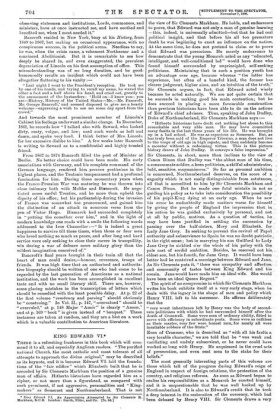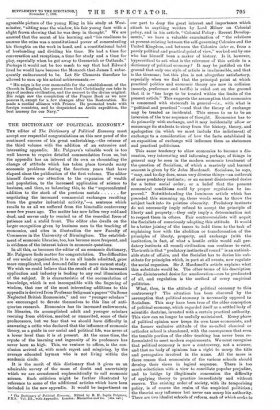KING EDWARD VI.*
THERE is a refreshing frankness in this book which will com- mend it to all, and especially Anglican readers. "The purified national Church, the most catholic and most tolerant of all attempts to approach the divine original," may be described as its keynote, and it is because Edward VI. laid the founder= tions of the "fair edifice" which Elizabeth built that he is accorded by Sir Clements Markham the position of a genuine man of affairs. Hitherto historians have regarded him as a cipher, or not more than a figurehead, as compared 'with such prominent, if not aggressive, personalities and " King- makers" as Somerset and Northumberland. That is not • ring Edward VI. An Appreciation Attempted by Sir Clements R. Markham, K.C.B. London': Smith, Cider, and Co. t7e.
the view of Sir Clements Markham. He holds, and endeavours to prove, that Edward was not only a man of genuine learning —this, indeed, is universally admitted—but that he had real political insight, and that before his all too premature death lie was beginning to exert an influence on the nation.
At the same time, he does not pretend to claim or to prove that Edward was precocious. He merely endeavour's to demonstrate that the young Monarch acted as any "educated, intelligent, and well-Conditioned lad" would have done who found himself surrounded . by unprincipled, self-seeking politicians. Maintaining that in such a position youth has an advantage over age, because whereas " the latter has experience, but often of a baneful kind, the former has clearer judgment, higher aims, and an intuition of the truth," Sir Clements argues, in fact, that Edward acted wisely because he acted naturally. We are not quite certain that be succeeds in making good his main contention; but he does succeed in placing a more favourable construction than previous historians have been able to do on the actions of Edward's chief advisers. Thus, speaking of John Dudley, Duke of Northumberland, Sir Clements Markham says :—
" Hitherto historians have dealt out nothing but abuse to this remarkable and very able man. He may have committed many faults in the last three years of his life. He was brought up in a bad school. He was as rapacious as Somerset. But, as has truly been said of the Emperor Tiberius, a man does not live to the verge of old age in high repute, and then suddenly become a monster without a redeeming virtue. This is the picture history draws of John Dudley. It conveys a false impression."
Sir' Clements, in short, more than inclines to the view of Canon Dixon that Dudley was "the ablest man of his time, a consummate soldier, a keen politician, a skilful administrator,
hold, sensitive, magnanimous." So far as personal ambition is concerned, Northumberland deserves, on the score of a sagacity which is not easily distinguishable from astuteness, all that is accredited to him by Sir Clements Markham and Canon Dixon. But he made one fatal mistake in not so guiding his policy as to take into consideration the possibility of his pUpil-King dying at an early age. When be saw his error he undoubtedly made matters worse for himself 'by giving the people of England the impression that in „.., his action he was guided exclusively by personal, and not at all by public, motives. As a question of tactics, he may have been justified in settling the succession by passing over the half-sisters, Mary and Elizabeth, for Lady Jane Grey. In seeking to prevent the revival of Papal authority and subservience to Spain he was no doubt patriotic_, in the right sense ; but in marrying his son Guilford to Lady Jane Grey he sicklied o'er the whole of his policy with the pale cast of sordid ambition. Besides, he reserved not his eldest son, but his fourth, for Jane Grey. It would have been better had be contrived a marriage between Edward and Jane., As Sir Clements puts it, "there was sympathy and affection and community of tastes between King Edward and his , cousin. Jane would have made him an ideal wife. She would have been an ideal Queen Regent." . .
The spirit of no compromise in Which Sir Clements Markham writes his bOok exhibits itself at a very early stage, when he deals with the legacy in the shape of men and policy- which Henry VIII. left to his successor. He affirms deliberately that the
" very worst inheritance left by Henry was the body of second- rate politicians with which he had surrounded himself after the death of Cromwell. Some were men of ordinary ability; fitted to serve with efficiency in subordinate posts. • Some were as ruthless as their master, very few were honest men, for nearly all were insatiable robbers of the State."
Even of Cranmer, who is described as "with all his faults a very lovable character," we are told that be " was weak and vacillating and unduly subservient, or he never could have worked so long with Henry. He acquiesced in the cruel acts of persecution, and even sent men to the stake for their beliefs."
The most generally interesting parts of this volume are those which tell of the progress during Edward's reign of England in respect of foreign relations, the protection of the country, and religious reforms. As soon as Edward began to realise his responsibilities as a Monarch he exerted himself,
and it is unquestionable that he was well backed . up by Northumberland. It is also to Edward's credit that he -took a deep interest in.the restoration of the currency, which bad
been debased by Henry VIII. Sir Clements draws a very
. .
agreeable picture of the young King in his study at West-
minster, "sitting near the window, his fair young face with a slight frown showing that he was deep in thought." We are assured that the secret of his learning and " his readiness to assume the reins was a constitutional power of concentrating his thoughts on the work in hand, and a constitutional habit of husbanding and dividing his time. He had a time for conversation and receptions, a time for study and a time for play, especially when he got away to Greenwich or Oatlan.ds." Perhaps it would not be too mach to say that had Edward
lived lie would have become the Monarch that James I. subse- quently endeavoured to be. Let Sir Clements therefore be allowed to sum up his actual achievements :- " His reign is for ever memorable for the establishment of the Church in England, the purest form that Christianity can take in days of modern civilisation, and the nearest to the divine original. His reign saw the completion of the Prayer Book as we now possess it, except for a, few changes after the Restoration. He made a cordial alliance with France. He promoted trade with foreign countries, and he despatched an Arctic expedition, the best nursery for our Navy."





























































 Previous page
Previous page